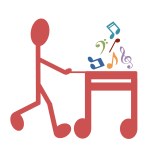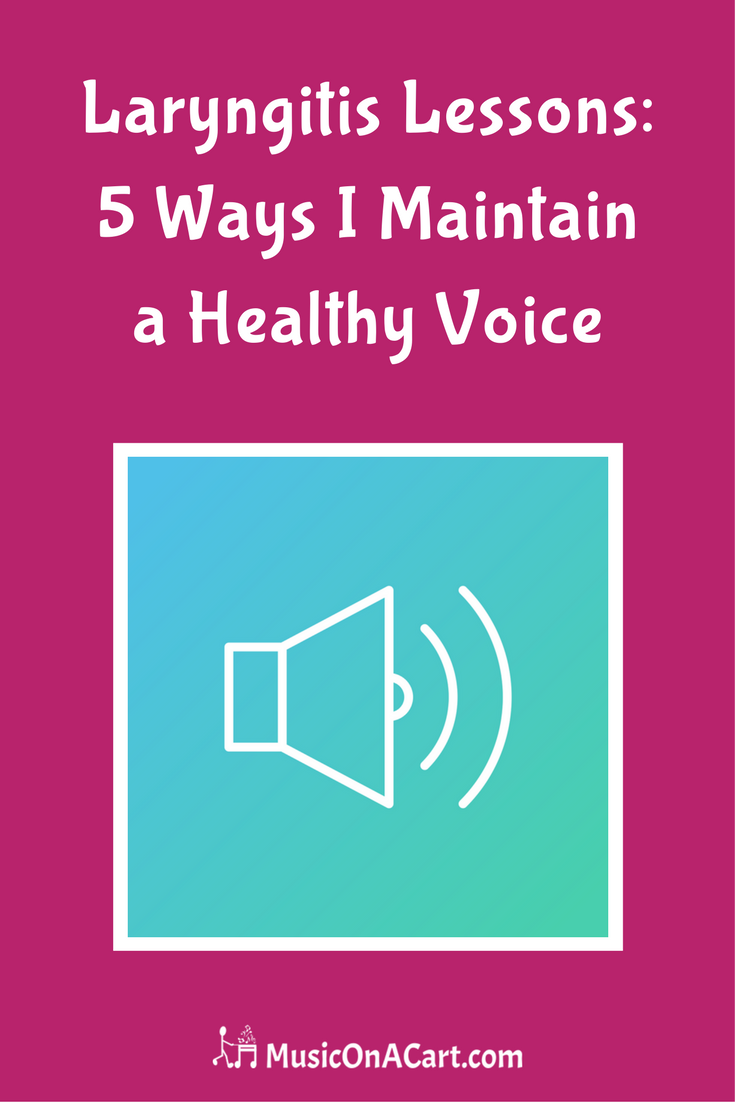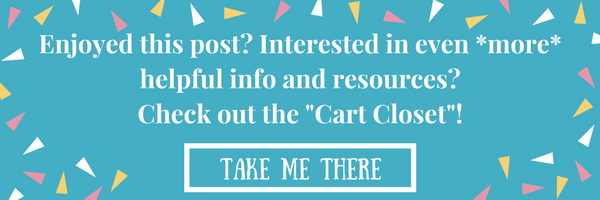Disclaimer: I am not a doctor or medical professional. Please consult your physician if you are experiencing health problems or concerns!
Singing, animal voices, sound effects, vocal explorations, and more...a music teacher’s voice certainly gets a lot of mileage! When I first began teaching, I didn’t realize just how much of a beating my body would take (I often joke that my music teaching job is the best gym plan ever, especially when you're teaching from a cart!) and that body beating has certainly included my voice. I also found that when germs bombarded my body, the inflammation would always target my throat…ALWAYS. This meant getting laryngitis multiple times during the year. After getting through those first few overwhelming years of being a new music teacher, I did eventually hit my stride and improved in balancing tasks and taking better care of my body in general. More recently, in reflecting on new habits I adopted, I pinpointed five specific changes I made that really aided in preserving and maintaining better vocal health, which in turn decreased my bouts of laryngitis (with last year being my first year of NO laryngitis).
1. Toggle Your Lesson Activities
For any teacher who teaches more than one grade level, you have to constantly reset and be "on" for every single class period. That repetition of lessons can take a toll vocally. So what I've learned to do is toggle the activities I teach in two ways: within the lesson and across grade levels. What in the world does that mean? Let's break it down.
Toggle within the lesson
If I have an activity that's a song, the activity that follows it might be a listening one. Or maybe I'll begin with a familiar song that the students are fine singing on their own, then I'll introduce and teach a brand new song that requires more use of my own singing voice. For my younger preschool and kindergarten classes, I'll alternate a song with a listening activity, or finger play spoken by me with a movement activity to recorded music. In the same way I alternate activities that have my students sitting down versus standing and moving, I also alternate singing and not singing to give my voice frequent breaks.
Toggle across grade levels
I may have one grade doing lots of songs, but another grade might be focusing more on a composer or listening unit. One grade might be working on layering instruments parts and vocal ostinati while another is folk dancing. I tier my grade level units so that I'm alternating the amount of vocal activities in order to prevent fatigue. This doesn't mean that there's not any singing at all for a certain grade level (my students still sing while they dance or play an instrument) it just means that singing isn't my main focus of the lesson and I personally am not doing the bulk of singing. Which leads me into the next point...
2. Allow Student Ownership
I've been learning this more and more with each passing year. I wrote in a previous blog post about the importance of student ownership as an aspect of classroom management, but when it comes to your vocal health as a music teacher, student ownership is also important. I'll use my "Hello Song" as an example. I begin all of my lower elementary music classes with the same hello song and use differentiated steady beat movements on each repetition. The only time I ever fully sing it from start to finish is the first few weeks of kindergarten and preschool classes (my first and second graders already know it from their previous years with me). However, after those first initial weeks of school, once students are familiar with it, I merely vocally establish the key, set the tempo, and off they go a cappella on their own (I don't use recorded music because I vary the length of the song depending on the day). Later in the lesson, when working on a new song, I remove my voice and simply mouth the words (not whisper, just move my lips silently...but with great enthusiasm!) while letting my students take over the singing as soon as possible. I'll only chime in during a difficult rhythmic phrase or tricky tonal part to help reinforce it. I'll also ask for a small group of student volunteers to come up with me to review a song with the class. Joking, I'll ask, "Raise your hand if you reeeeally think you can sing the song without my help. I dunno, I ask my 4th graders to do this, you think you can do it, too?" Wanting to prove that they're big kids, too, I'll usually get a number of volunteers! And after they come up to sing I gush over a part that they did great. For example, they might not have been in tune, but if they remembered a tricky word or rhythm, I point that positive thing out and play it up! Give your students ownership over the singing as much as possible. It's good for them and it's good for you...it's a win-win situation!

3. Enjoy Some Lunchtime Solitude
I'll preface this by saying that I consider myself a 'social introvert'. I say this because I don't mind being around groups of people, speaking at conferences, and I'm of course very outgoing while teaching my kiddos. But I admittedly recharge best when alone, hence the introvert part. Now, even with that disclaimer, please still hear me out! I encourage you to think about not spending all of your lunchtime up in the faculty room. It's so easy and enticing to talk for most of that time...talk about your morning, talk about students, talk about the broken copier, talk, talk, talk. I've found that even when I intend on just sitting there quietly eating, I'll still get roped into a conversation with people asking me questions about stuff. Consider eating elsewhere so your voice can have a break. Since I'm on a cart, I have no music room to utilize, but I'll sit in my car if the weather's nice or sit at wherever my prep space is for that year and let my voice rest for that precious down time. I've had years in which my schedule didn't have a full prep period on particular days, so lunch would be the only stretch of time in which my voice could truly relax. Utilize that time!
4. Get Sufficient Sleep
Easier said than done, right? This was so hard for a majority of my teaching career. I just couldn’t manage to get the amount of sleep that I knew I needed. I’ve found, for me, there’s an ideal number of hours my body specifically needs and when I sleep for less than that amount, I’m struggling to get through the day. I get sluggish and I "hit the wall" at lunchtime and then again after school, which isn't good because I teach private piano lessons after school hours. Doing that for several days in a row would bring on a cold or cold-like symptoms due to a lower resistance to the germs I faced daily. One year, after multiple days of insufficient sleep, I got a super bad bout of the flu, which also made me miss a Spring Break vacation trip I was really looking forward to going on. That was the last straw. I finally came to my senses and put my foot down. I decided that when it reached a certain hour of the night, I would force myself to stop working. My brain knew I was done, my body knew I was done, so why not just accept the fact that trying to push past that exhaustion point would slow down any productivity anyway. After setting that limit, I realized that half the battle of time management was a lack of thorough organization, so I worked on that. The triple threat of setting work time limits, getting sufficient sleep, and better organization has left me feeling GREAT this school year. I have so much more energy and am much more efficient doing work at my most alert hours. This allows me to relax for the remainder of the evening and get a good...night's...rest. It’s glorious! 😌

5. Water, Water Everywhere!
I didn’t realize until last year just how dehydrated my body was. You hear many touting the benefits of water and that’s for good reason. I’m not a big caffeine drinker (I love coffee and soda, but I'll only have them maybe twice a year, if that) and I knew water was important, but I'd only drink about one bottle of water a day. I began to gradually increase my water intake, being sure to sip constantly throughout the day both at work AND at home. As time went on, I started noticing that not only did my voice feel so much better, but my skin felt softer and breakouts I was attributing to stress disappeared (though the stress of life didn't disappear). I feel that the combination of lots more water (and more sleep like I mentioned above) helped my body to repair and replenish itself.
And while we’re on the subject of water, it’s worth mentioning that many singers I knew slept with humidifiers during the drier seasons of the year. So I decided to invest in one and I've found my throat isn’t so parched when I wake up during those dry winter mornings. Another tip from singers I took on was gargling. Some people gargle with plain warm water, while others like a saltwater gargle or a diluted apple cider vinegar mix. I like to gargle with a 50/50 mix of warm water and hydrogen peroxide (the 3% brown bottle kind found in grocery or pharmacy stores), but I'm careful not to swallow any mixture I gargle with! Diluted peroxide gargles aren't for every day (always follow instructions on the label), but when I feel a potential cold coming on or if I had a heavy singing day, I'll gargle when I get home from work and again before I go to sleep.
Water. Drink it, breathe it (well, the humidifier vapor), gargle it!
So, those are my top 5 vocal health tips. Of course it's not a comprehensive list, just what I've found to be particularly helpful for my music teaching as of recent. What are your top tips for vocal health? Are you also prone to laryngitis? Have you had to change any bad vocal habits or other things that you realized were damaging to your voice? I'd love to hear about it...please let me know in the comments below!
Encouraging you to rock as you roll,

Connect:






